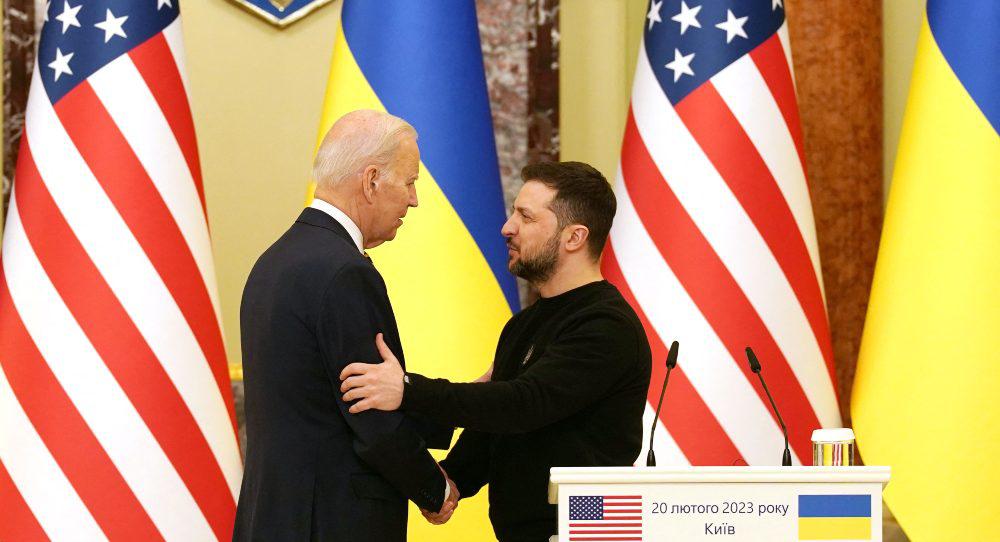Judy Dempsey
{
"authors": [
"Judy Dempsey"
],
"type": "commentary",
"blog": "Strategic Europe",
"centerAffiliationAll": "",
"centers": [
"Carnegie Endowment for International Peace",
"Carnegie Europe"
],
"collections": [
"Europe’s Eastern Neighborhood",
"EU Integration and Enlargement"
],
"englishNewsletterAll": "",
"nonEnglishNewsletterAll": "",
"primaryCenter": "Carnegie Europe",
"programAffiliation": "",
"programs": [],
"projects": [],
"regions": [
"Russia",
"Europe",
"North America",
"Eastern Europe",
"United States",
"Ukraine",
"Western Europe"
],
"topics": [
"Foreign Policy",
"Security",
"EU"
]
}
Source: Getty
The West’s Race Against Time in Supporting Ukraine
The Europeans must match their rhetorical support for Ukraine with more military aid. This could put an end to Russia’s war and avoid a division of Europe.
U.S. President Joe Biden’s visit to Kyiv on February 20 was a fillip for the Ukrainians. It was also a victory for Ukraine’s President Volodymyr Zelensky.
Ever since Russia’s full-scale attack on Ukraine a year ago, Zelensky has tirelessly worked to persuade Western leaders help Ukraine defeat the aggressor. Biden’s visit has immense symbolic importance for the people of Ukraine and perhaps brought hope to some. But neither are going to win the war.
This is a brutal war taking place on the European continent. The toll has been immense. Russia’s indiscriminate bombing of Ukraine’s cities, towns, and villages has no end in sight. The destruction of civilian infrastructure, the killing of so many people, and the huge internal displacement of millions of Ukrainians as well as millions who have become refugees continues. Children have been kidnapped and taken to Russia. And when Russia has taken over a city, such as Mariupol, suffering and deprivation prevails. Life in this destroyed city is beyond belief and relief.
Europeans now have a choice: allow this war to drag on or, as a recent headline in The Economist put it, “get the job done.”
Europeans can continue to provide financial and economic assistance to Kyiv. And they can continue to supply weapons. But the unseemly debate—and blame game—over which country would actually send its German-made Leopard 2 tanks to Ukraine has exposed an unwillingness by Europeans to go all out to militarily help Ukraine. The stakes are too high to hold back, for several reasons.
First there is the sheer scale of the human suffering that is beyond the physical. “Many citizens are traumatised by their war experiences,” writes Susan Stewart in a new set of essays by the German institute for International and Security Affairs. “In addition, polarisation will probably increase between those living in Russian-occupied territories and those living on territory controlled by Ukraine,” she adds. There’s the sense of loss, of insecurity, of fear. While Europeans enjoy their comfort zone—dented by an increase in their energy bills thanks to Russia’s invasion—there is no comfort zone for Ukrainians.
Secondly, there is the political imperative for Europeans to defend Ukraine. If the EU wants to protect what is left of the rules-based order that President Vladimir Putin is ruthlessly testing if not tearing up in Ukraine, this surely means it must defend Ukraine’s right to defend its sovereignty, independence, and territorial integrity.
Related to this, Russia’s war against Ukraine is ultimately about destroying Ukraine. In this context, Europeans know full well what a Russian victory would mean for the rest of Eastern Europe. Just look at what is taking place in Moldova, a candidate member of the EU. Pro-Russian backed movements are doing everything possible to overthrow the pro-Western government in Chisinau. In Georgia, the political atmosphere has become poisonous as pro-Russian oligarchs encourage polarization and the further erosion of fragile democratic institutions.
Meanwhile, according to a recently leaked document, the Kremlin has plans to “absorb” Belarus. Whether that is true or not, Russia’s war against Ukraine, its intentions regarding Belarus, and its attempts at destabilizing Moldova and Georgia have consequences for Europe. This is not just about tearing up the post-1989 international order and the rulebook that underpinned it. This is about Russia exporting instability and insecurity.
That should be another reason for Europeans to recognize the ramifications of what is happening in Ukraine. It is about Russia attempting to restore its political and military control in Eastern Europe. Were that to happen, Europe could again become divided. And it would be a division based on instability and coercion.
With cajoling by the Biden administration, Europeans have come a long way in supporting Ukraine. But ultimately, despite all the reasons to go further in order to end this war, Europeans are afraid. Of Russia.
One hears reasons, especially among the left in Germany that providing more military assistance to Ukraine would lead to an escalation and that in any case, one should negotiate with Putin. Leaving aside the moral and political reason why Ukraine has the right to defend itself, Russia’s conduct of this war has been and continues to be an escalating one.
There is also the view that by providing more military assistance to Ukraine, Europe would be dragged into the war that would give the Kremlin the excuse to threaten Ukraine but also Europe with its nuclear weapons. China has made its opposition to these threats clear to the Kremlin.
As this war moves into year two, Europeans know the stakes involved. The risks of playing them down would amount to disowning Ukraine’s fight for and its right to its independence. It would embolden Russia and pave the way for a divided Europe.
About the Author

Nonresident Senior Fellow, Carnegie Europe
Dempsey is a nonresident senior fellow at Carnegie Europe
- Europe Needs to Hear What America is SayingCommentary
- Babiš’s Victory in Czechia Is Not a Turning Point for European PopulistsCommentary
Judy Dempsey
Recent Work
Carnegie does not take institutional positions on public policy issues; the views represented herein are those of the author(s) and do not necessarily reflect the views of Carnegie, its staff, or its trustees.
More Work from Strategic Europe
- Europe on Iran: Gone with the WindCommentary
Europe’s reaction to the war in Iran has been disunited and meek, a far cry from its previously leading role in diplomacy with Tehran. To avoid being condemned to the sidelines while escalation continues, Brussels needs to stand up for international law.
Pierre Vimont
- Taking the Pulse: Can European Defense Survive the Death of FCAS?Commentary
France and Germany’s failure to agree on the Future Combat Air System (FCAS) raises questions about European defense. Amid industrial rivalries and competing strategic cultures, what does the future of European military industrial projects look like?
Rym Momtaz, ed.
- Macron Makes France a Great Middle PowerCommentary
France has stopped clinging to notions of being a great power and is embracing the middle power moment. But Emmanuel Macron has his work cut out if he is to secure his country’s global standing before his term in office ends.
Rym Momtaz
- How Europe Can Survive the AI Labor TransitionCommentary
Integrating AI into the workplace will increase job insecurity, fundamentally reshaping labor markets. To anticipate and manage this transition, the EU must build public trust, provide training infrastructures, and establish social protections.
Amanda Coakley
- Can Europe Still Matter in Syria?Commentary
Europe’s interests in Syria extend beyond migration management, yet the EU trails behind other players in the country’s post-Assad reconstruction. To boost its influence in Damascus, the union must upgrade its commitment to ensuring regional stability.
Bianka Speidl, Hanga Horváth-Sántha










